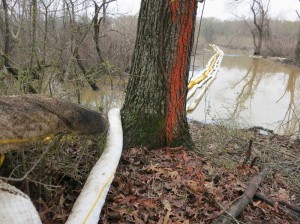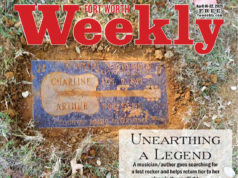The absence of any laws requiring liability insurance on pipelines or most other oil and gas operations puts homeowners and other property owners in a particularly vulnerable position. Just how vulnerable became clear last year, when homes in Youngstown, Ohio, were damaged by earthquakes blamed on nearby drilling of gas wells and related waste-disposal wells.

Elizabeth Radow, a New York real estate attorney, said that Nationwide Insurance “told homeowners they were not going to cover the damages because the earthquakes were caused by industrial activity.”
Most people don’t realize that, she said. “With anything that’s inherently dangerous, like a company that works with dynamite, it’s difficult to get insurance.
“In the insurance chain, you’ve got homeowners who typically plant gardens, put out their laundry, that sort of thing. But with urban drilling, we’re combining two formerly unconnected practices — residential living and industrial activity.”
Until now, she said, the two were generally separated: You strip-mine in one place and people live elsewhere. “But now you’re superimposing industry on residential living, and that’s inherently chaotic.”
The problems start with basic homeowner’s insurance. “You can’t have a mortgage without homeowner’s insurance,” Radow said. “And 90 percent of all mortgages are sold into the secondary mortgage market, and those are on a standard form — they all require homeowner’s insurance. And the things that gas leases allow the drillers to do are specifically not allowed by those mortgage lenders.
“You’re specifically not allowed to have hazardous materials on your property. You’re specifically not allowed to have industrial activity on residential property. And gas and oil drilling, pipelines and so forth, are all industrial activity. So if something goes wrong — as we saw in Youngstown with the earthquakes — the homeowner’s insurance policies are not going to pay, leaving you to sue the gas or oil company for damages. And even companies with good insurance policies will quickly exhaust those funds in the case of a major incident.”
Homeowners are particularly vulnerable because in most cases they have no control over pipelines and other oil and gas activity near their homes. Pipeline companies, with the right of eminent domain, can put pipelines under private property whenever they like. In oil and gas drilling, the practice of forced pooling — when horizontal drilling is done beneath private property despite a homeowner’s objection — simply overlays industrial activity onto residential property.
It’s not just the homeowners who are out of luck, Radow said. “That secondary mortgage market is worth $6.7 trillion in this country. And if some of that, the collateral on those mortgages, have problems with filthy water, contamination, bad air — well, that market will nosedive because the value of those homes will fall. And where does that leave the pension fund that has invested in that secondary mortgage market? Nowhere. And there are millions and millions of properties in that market where industrial activity is going on, particularly gas drilling. So not only will the homeowner be hurt, but the investors will be hurt as well in the event of a major gas or oil problem.”
********
Fort Worth’s city code requires pipeline companies, when their lines cross city rights of way, to carry at least $1 million in general liability insurance and $10 million in property damage liability.
But those requirements relate only to insurance for damage done to city property — not to anything that happens on private property or that affects the welfare of the public.
Rick Trice, assistant director for Planning and Development over gas wells and leasing, acknowledged a serious gap in pipeline insurance. “The license agreements do insist on the insurance, but that insurance only covers city property and parks — not any private property within the city limits,” he said.
In an urban setting, a catastrophic event could quickly consume any insurance settlement to the city, while leaving residents completely on their own to sue for any repayment of damages.
Nauser, the spokeswoman for Access Midstream, had said she would try to find out how much insurance the pipeline company carried. However, she did not reply with that information before the Weekly went to press.
Houston has similar insurance and bond requirements, but Alvin Wright, spokesman for Houston’s Department of Public Works and Engineering, said that there was a big difference between the two cities. “Houston certainly has a lot of pipelines running through it, but most of them are not in residential neighborhoods,” he said. “And then we never had the quantity of gas pipelines that Fort Worth has. As a result, we’ve never had the kind of major pipeline catastrophes you see in other parts of the country.”
Americans are familiar with requirements that individuals obtain insurance in order to drive cars on public roads, to obtain mortgages, even to make sure a package gets delivered to the right address. But many people the Weekly spoke with were surprised at the lack of state and federal insurance requirements for pipelines and other oil and gas operations.
Few of the oil and gas companies contacted for this story — or their insurance companies — were willing to discuss the topic.
Tim Ruggiero, partner with former DISH mayor Calvin Tillman in ShaleTest, an environmental testing organization that works with lower income communities to assess the impact of the shale oil and gas industry, said he hadn’t realized there were no state or federal insurance requirements. But neither was he surprised.
“With these businesses, it seems that at every turn they pull something else out of the playbook to cover themselves no matter what the event might be” he said. “And they all work to lessen their liability at the expense of either their investors or the people actually affected by the spill or explosion.”
State Rep. Lon Burnam, of Fort Worth is incensed by the whole issue. “Since industry is allowed to self-insure, who covers individuals affected by gas explosions?” he said.
The reality is that oil and gas companies have a huge influence over the legislative process, both on national and state levels, Burnam said.
“During the recent Texas legislative session, the oil and gas companies wouldn’t even allow a change in the name of the Railroad Commission — and they got their way. If they can control something as picayune as that, imagine the control they will exert over issues like insurance to protect the public.”












Fact Check: The OIl Spill Liability Trust Fund is managed by the U.S. Coast Guard’s National Pollution Funds Center, not the EPA. See www dot uscg dot mil/npfc
Yes, it’s managed by the Coast Guard for the EPA. Please double check as appears on EPA site.
Thanks for double checking.
Peter Gorman
I’ve been out of town with limited internet access so I just got to read this.
I think this sums up what I just read:
They can forcibly take our land, install industrial processes in our backyards against our wishes, then don’t have to pay damages if they blow us up. What’s more, our insurance won’t pay because they aren’t supposed to be in our backyard.
So when the GOP talks about personal responsibility that doesn’t apply to the Fossil Fuel Mafia.
That’s a lot of “they’s”, Sharon. Let’s put faces and names on them like, Julie Wilson, or Tillerson, the entire state legislature or even, damn it, Obama. Let’s elect Bill Nye the science guy for gov. I’m tired of being pushed around by a bunch of “they’s.”
I am incensed when I hear about the dirty practices of the oil industry. It has run this country for too long. The Pegasus and Seaway pipelines run over an aquifer that eessentially provides the water to the DFW metroplex- if they were to explode, the issue isn’t whether we get paid; the issue is that we won’t have clean water to drink, bathe and wash. The risk is unacceptable for the state to allow. I say we get moving on quitting oil and start gleaning on new energy sources. Thank you for writing to inform the public.
Makes me sick to see them get away with this. Look at what an Independent Trucker has to pay for to carry a hell of allot less… The lowest public liability limit required by the FMCSA is $300,000 which is for vehicles that are under 10,000 pounds GVW. The most common is $750,000 which is for vehicles that are 10,001 GVW or more pounds. When you are carrying hazardous materials the requirements increase to $1,000,000 and if you carry liquid hazardous materials such as gasoline then the limit will be $5,000,000.
If a pipeline company condemns there’s not much you can do. Most people are not condemned & are able to put whatever requirements they want into their agreement.
I guarantee when you use a private company’s land, like a railroad, you are required to carry insurance.